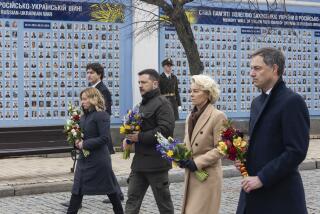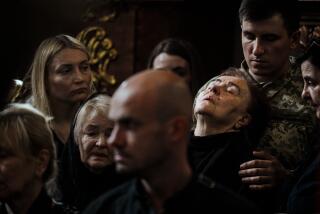NATO Force Struggles to Bring Order to Kosovo
- Share via
PRISTINA, Yugoslavia — NATO-led peacekeeping troops sought to maintain order in Kosovo on Friday as ethnic Albanian refugees poured back into the province at an unprecedented pace and a wave of violence left 14 dead in this capital.
U.S. Marines stationed in southeastern Kosovo, meanwhile, came under attack Friday for a second time this week and returned fire. The Marines were manning an outpost in the town of Gnjilane, about 20 miles southeast of here, according to the U.S. European Command in Germany,
The Marines later found a wounded civilian lying next to an AK-47 automatic weapon. It was unclear whether the man, who later died, was a Serb or an ethnic Albanian. On Wednesday, Marines killed one Serb and wounded two others after gunmen opened fire on a Marine patrol in a village south of Gnjilane.
The violence both inside and outside Pristina underscored the volatile atmosphere that has taken hold in Kosovo, a province of Yugoslavia’s main republic, Serbia, despite an ever-expanding presence of international peacekeepers, whose numbers now exceed 21,000.
In Pristina, the bloodiest 24-hour period to hit the capital since peacekeepers arrived June 12 began early Thursday, and by the end of the day, 14 people had been found slain.
In one incident, a family of ethnic Albanian refugees returning to Pristina found Serbs living in their home, triggering a gun battle that left a member of each family dead. The violent clash continued in the hallways of Pristina’s main hospital, where a nurse and porter were injured by feuding relatives of the victims.
British soldiers serving with the peacekeeping Kosovo Force, or KFOR, intervened and seized two pistols and two grenades.
Peacekeepers also swept the hospital and confiscated 247 automatic weapons, plus a like number of pistols and knives, a U.N. official said.
“The situation in Kosovo will remain tense in the near future. . . . We have to expect that,” NATO spokesman Maj. Jan Joosten of the Royal Netherlands Army said during a news conference here Friday.
“I can only reiterate that the citizens of Kosovo must exercise restraint.”
Unconfirmed reports that the hospital’s head of surgery, a Serb, had been slain stoked new fears among Pristina’s dwindling Serbian population. Military police showed up Friday afternoon at Dr. Andrija Tomanovic’s hospital office to investigate his disappearance.
“He could have left on his own, or he could have been kidnapped,” said Lt. Tim Lund of the British 2nd Field Ambulance Forward Squadron. “We don’t know.”
“I think he’s been killed,” said Dr. Novica Petrovic, a colleague of Tomanovic. “Otherwise he would have called.”
The hospital has been the scene of considerable strife this week, as ethnic Albanians who lost positions earlier in this decade seek to reclaim jobs.
Serbs say many of the hospital’s Serbian staff members have left or been driven out in recent days. Petrovic, for example, said he was recently forced from his job as director of the hospital’s neurological clinic.
48,000 Refugees Return to Province
As peacekeepers struggled to get a handle on the violence, 48,000 ethnic Albanian refugees returned to Kosovo on Thursday, a one-day record since the refugees began following peacekeepers into the province two weeks ago, and relief agencies said it was possible that Friday’s total, once tallied, would be higher.
“This is one of the largest spontaneous returns we have ever seen in the last 25 years of any operation,” Paula Ghedini, a spokeswoman for the Office of the U.N. High Commissioner for Refugees, or UNHCR, said Friday.
The NATO-led peacekeeping mission that paved the way for the refugees’ return suffered another casualty Thursday when an Italian soldier accidentally shot himself when he dropped his gun as he was preparing to go on patrol.
The victim, 1st Cpl. Pasquale Dragano, 21, of the Garibaldi Brigade, was rushed to the Pristina hospital, where he later died of a gunshot wound to his arm and jaw.
In Serbia, meanwhile, hundreds of Yugoslav army reservists who had blocked several highways for the past two days ended their protests Friday after the army promised full payment of overdue wages for fighting in Kosovo, the independent Beta news agency reported.
Yugoslav Reservists End Blockades
The largest and rowdiest protest--by the 5522nd Tank Brigade in Kraljevo, about 75 miles south of Belgrade, the Yugoslav and Serbian capital--ended after hours of negotiations between unpaid soldiers and the local commander. Tanks and armored personnel carriers that had blocked every road into and out of the city were gone by evening.
Two soldiers were wounded during the blockade--one who was knocked over and nearly crushed by an armored vehicle moving in reverse, and another who was wounded in the arm by gunfire, local journalists said. Many soldiers drank beer and fired automatic rifles into the air, but the protest was otherwise peaceful.
Similar barricades by unpaid reservists were lifted in Velika Plana and Cerovac, also in central Serbia. All the soldiers, who were earning about $5 a day for Kosovo duty, said they had not been paid since April. Yugoslav troops completed their withdrawal from Kosovo last Sunday.
Army officials were able to promise the money after Yugoslavia’s federal parliament voted Friday to extend some emergency economic measures beyond the 3-month-old state of war, which is ending today.
The parliament’s action legalized and extended wartime decrees that gave the government a virtual monopoly on foreign trade and imposed war taxes to finance additional army expenditures.
The cost of rebuilding Yugoslavia, which sustained heavy damage during 11 weeks of airstrikes by NATO warplanes, has been estimated by private economists at $30 billion. Western leaders have said they will provide no aid to rebuild Serbia--with the exception of Kosovo--as long as Yugoslav President Slobodan Milosevic remains in power.
In Moscow, members of Russia’s Federation Council, the upper house of parliament, gave formal approval Friday for the deployment of 3,600 peacekeepers in Kosovo. The vote, 159-0, was a strong endorsement of Russia’s participation in the force despite serious worries over how it will pay for the mission.
Russian Troops Might Move In Soon
Russian Defense Minister Igor D. Sergeyev said the Russian peacekeepers likely will begin moving into Kosovo on Monday, though news reports suggested a small advance party of paratroops could land as early as today.
They will join about 200 Russian soldiers originally based in Bosnia-Herzegovina who entered Kosovo in a surprise deployment June 12, hours ahead of the first North Atlantic Treaty Organization peacekeepers, and set up camp at the Pristina airport.
First Deputy Prime Minister Viktor B. Khristenko estimated that it will cost Russia about $70 million a year to take part in the operation--a steep price tag for a country still digging out from a massive financial collapse.
“Members were guided more by the strategic interest of the state, rather than by some petty bookkeeping concerns,” said Oleg P. Korolev, deputy chairman of the Federation Council.
Russian officials clearly hope the United Nations will provide at least partial funding for their troops, as it has in Bosnia.
Lawmakers said they decided that Russia’s presence in the international force, which is expected to number about 50,000 when fully deployed, is more important than the cost, which amounts to nearly 20% of the country’s annual defense budget.
“If we are not active in the Balkans now, we will be treated like a small power,” said Alexander S. Dzasokhov, president of the republic of North Ossetia and a member of the Federation Council.
“It would mean Russia isolating itself and would be an economic defeat.”
President Boris N. Yeltsin is expected to sign an order dispatching the troops, a step still required before the deployment can occur.
*
Times staff writers John J. Goldman at the United Nations, Richard Boudreaux in Belgrade and Maura Reynolds in Moscow contributed to this report.
*
* CLINTON HOLDS GROUND: The President says Slobodan Milosevic must go if Serbia wants U.S. aid. A16
(BEGIN TEXT OF INFOBOX / INFOGRAPHIC)
REBUILDING KOSOVO
The Challenge: Investigating ‘One of the Largest Crime Scenes in History’
Forensic experts began arriving in Kosovo this week to start the gruesome task of inspecting mass graves and other sites, seeking firsthand evidence of the brutality that raged across the province until Yugoslav President Slobodan Milosevic accepted an international peace plan. Their mission: to help supply evidence for the war crimes cases being assembled at an international tribunal in The Hague.
The trial’s initial phase, the collection of evidence, has already begun. The tribunal expects participation from 12 to 14 NATO nations, including the United States, Britain, Canada, Norway, France and Denmark. Each country will provide its own team of experts and lab analysis. Peacekeeping troops will guard alleged crime scenes and provide a secure environment for investigators as they begin the difficult and delicate process of sifting through debris.
The magnitude and complexity of the international undertaking were underscored by FBI Director Louis J. Freeh, who called Kosovo “one of the largest crime scenes in history.”
As part of the U.S. effort, about 60 FBI agents and evidence specialists arrived in Djakovica, an area of Kosovo under Italian control, on Wednesday. There they will investigate two alleged massacre sites. Team members include experts in evidence col-lection and preservation, explosives, crime scene photography, crime scene recon-struction and forensics.
According to the FBI, the tribunal has asked investigators to:
* pinpoint locations of alleged crime scenes
* photograph the scenes, including any bodies and evidence found
* create detailed maps of the sites
* collect any physical evidence
* examine bodies to determine cause of death, including indications of restraint or physical abuse, and make preliminary identifications by sex and age
* collect samples from bodies for possible DNA analysis and identification
More to Read
Sign up for Essential California
The most important California stories and recommendations in your inbox every morning.
You may occasionally receive promotional content from the Los Angeles Times.













